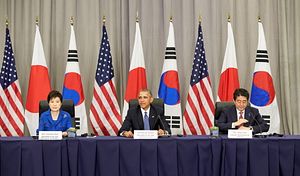Donald Trump’s presidential bid has been remarkable for many reasons. That he continues to lead the Republican nominating field is astonishing given his lack of policy detail and appalling attitudes toward a wide variety of groups — Latino migrants, people of Islamic faith, women, and journalists, to name a few. He lies frequently and unashamedly and comports himself like a spoiled 10-year-old used to the indulgence of careless parents and feckless relatives.
As the frequency of primaries eased in recent weeks, Trump was indulged by both The New York Times and the Washington Post in lengthy interviews on questions of foreign policy. Both papers have released the full text of the interviews, which make for astonishing reading. Had an undergraduate student in one of my classes given essay answers of the kind that Trump did, she would be lucky to receive a passing grade. Yet in his musings Tump put his finger on a crucial if overlooked feature of Asia’s strategic setting: the extent to which it is determined by domestic political and economic circumstances in the United States.
Far too often we think that international politics are isolated from the more mundane matters of the domestic. The image that normally prevail is of the chess game rationally played out on the international stage in which national power, spheres of influence, and strategic game playing operate according to their own unique logic. According to this view, to understand why China has built 3,000 acres of artificial islands one should look at the changing regional balance of power and not internal developments in the PRC. Yet Trump’s comments — that America’s alliances don’t deliver the United States very much, that Japan and South Korea should think about acquiring nuclear weapons as Washington may not always be there — remind us that all the of the core features of Asia’s international order are the function of choices that states make — choices that are fundamentally conditioned by their domestic economic and political circumstances.
Even though the world is unlikely to experience the surreal world of a Trump presidency, his foreign policy thinking, such as it is, has served to focus the mind on just how much the region has at stake in the U.S. elections. Crucially, he has reminded us that even though U.S. policy in the region has appeared to be almost immutable, it is subject to the same pressures, economic and political, as any other government choice.
U.S. power in Asia is organized through alliances. In return for providing protection and security guarantees, including nuclear ones, Washington gets a geographic presence through which it can pursue its strategic objective of ensuring that a great power capable of threatening its interests does not emerge in the region. A hugely beneficial consequence of these arrangements has been the damping down of uncertainty and rivalry that would otherwise have occurred had Japan, South Korea, and Taiwan not had American protection. If the United States were to change its attitude toward its allies, then the consequences for regional stability would likely trigger a huge escalation in defense spending, rivalry, and suspicion.
Notwithstanding Pyongyang’s ambitions, presently East Asia is home to one genuine nuclear power, China. Countries that might otherwise have developed these weapons, Japan and South Korea most obviously, have opted not to do so because they find comfort under the U.S. nuclear umbrella. For many this offer has always been somewhat unreliable — would Washington really treat an attack on Seoul as if it were an attack on San Francisco? — and the election cycle has brought these long standing doubts to the surface.
A Washington that is less interested in paying for and providing a crucial component of Asia’s geopolitical stability due to domestic priorities, however conceived, will create a highly contested Asian order. If the United States were to cede its strategic position in East Asia, the vacuum it would create would be hugely destabilizing.
The part played by the United States in Asia’s security order is hugely significant. It has been in place for the better part of four decades, yet its durability does not mean it will always be there. Washington has in the past placed a high premium on its approach, but shifting circumstances at home, a changing domestic political landscape, a growing nativism fueled by globalization and the failure to explain American foreign policy to the broader population has unsettled Asia. It reminds us that the regional order is not the product of a chess game operating separate from the circumstances of the regional powers but is fundamentally bound up in events that occur within these societies. As U.S. electors vote in November they will not only make a choice that will effect the high profile issues of immigration and stagnant middle class wages, it will shape how Asia’s international order will operate.
Nick Bisley is Executive Director of La Trobe Asia and Professor of International Relations at La Trobe University.
































